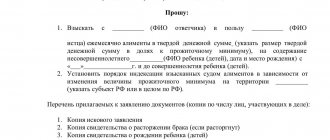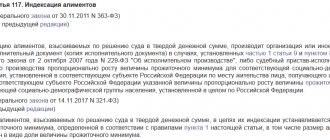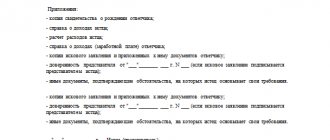In most cases, the correct way to protect the rights of a child is to apply for a child support order, rather than to file a lawsuit. Because if the case must be considered by order, and a statement of claim is filed, the court will not consider the claim.
This method of going to court as an application for a court order is mandatory when there is no dispute about the paternity of the child. And there are no other interested parties, for example, another recipient of alimony (a child from another marriage, including a civil one). And when the requirement for alimony is associated with a share of income, and not the cost of living (in hard cash). Please note that if we are talking about alimony not for a child, but for other family members, a claim is filed.
You can download the sample application presented on the website and fill it out, taking into account the specifics of your specific situation. After that, all that remains is to file an application with the court and wait for the court order to collect alimony.
|
Details of writ proceedings and the issuance of court orders can be found in a separate article.
| Note! |
| Court order |
Who has the right to apply for a court order for alimony?
The right to file an application for a court order to collect alimony for minor children belongs to the child’s parents, guardians and trustees, representatives of the guardianship authority and the administration of children’s specialized institutions (orphanages, shelters and others).
| Note! |
| New in the law on child support |
The main condition is that the child must be supported by the person who applies to the court. Only such a citizen has the right to demand the recovery of alimony from parents. And parents are persons who, by virtue of the direct instructions of the Family Code of the Russian Federation, are obliged to support their children. One of the parents can apply for a court order to collect child support from the other only if the child lives with him and he supports him. It is not necessary to dissolve the marriage.
If the child is not being raised by his parents, then the officially appointed guardian or trustee will have the right to collect child support. And if a child is in an orphanage - the management of this institution.
Preparing an application for a court order to collect alimony
Before preparing an application, you need to collect documents giving the right to collect alimony:
- birth certificate of the child(ren);
- certificate of family composition;
- certificate of marriage (divorce)
The birth certificate will confirm the right of the claimant to apply for a court order, and the debtor to pay child support.
If information about the child’s father is not entered (there are dashes) or entered arbitrarily (according to the mother), it will not be possible to collect alimony by court order if there is no decision. In this case, paternity must be established simultaneously with child support.
For information on establishing paternity and collecting alimony, see the special article.
| Note! |
| Statement of claim to establish paternity |
A certificate of family composition will confirm that the child lives with the alimony claimant. Instead of a certificate, you can attach other documents confirming the child’s residence with the applicant. For example, information about registration at the place of residence, a court decision to determine the child’s place of residence.
After collecting documents, you need to determine which court to apply for a court order for alimony. The application for a court order is considered exclusively by the magistrates' court. Documents can be submitted at the place of residence of the applicant or at the place of residence of the debtor. The choice depends solely on the applicant.
After collecting documents and determining jurisdiction, download a sample application for a court order to collect alimony from our website and fill it out, guided by the information provided. The application can be typed or handwritten (legibly). The amount of alimony depends on the number of children the debtor has.
| Note! |
| Child support amount |
Order received - what next?
One of the advantages of the order of alimony is the accelerated review period (5 working days). The document comes into force 10 calendar days from the date of its delivery to the debtor.
At the request of the claimant, after the order has entered into legal force, the court may send documents for execution.
If the payer’s place of work is known, the court order can be sent to the employer (or to the place of study, if the debtor receives a scholarship).
Withholding of funds from the debtor's salary is carried out on the basis of an application indicating:
- name of company;
- personal data of the claimant;
- information about the existence of a court order (when and by whom it was issued);
- account details for transferring alimony.
Documents can be delivered in person or sent by registered mail.
If the debtor lives in another city or hides his place of work, the court order must be submitted to the FSSP unit.
Enforcement proceedings are initiated at the request of the claimant.
The application contains the following information:
- name of the FSSP department;
- information about the applicant (last name, first name, patronymic, contact details);
- data of the court order (when and by whom it was issued, case number);
- information about the debtor (last name, first name, patronymic, telephone number, residential address, place of work);
- amount of alimony and terms of collection;
- Bank account details for transferring payments.
| Application for initiation of enforcement proceedings |
Enforcement proceedings are opened no later than 3 days from the moment the documents are received by the bailiff service unit (Article 30, Federal Law No. 229-FZ “On Enforcement Proceedings”).
The procedure for collecting alimony by court order by a bailiff includes establishing the payer’s place of work. If necessary, an FSSP official conducts a search for the debtor’s property, which may be subject to foreclosure.
Filing an application for a court order to collect alimony
You can submit your application in person or send it by mail. The address of the magistrate's precinct can be easily found on the Internet.
an application for a court order to collect alimony within five days from the date of receipt of the application without summoning the parties to court (Article 126 of the Code of Civil Procedure of the Russian Federation). Based on the results of consideration of the application, a court order is issued to collect alimony.
A copy of the court order is sent to the debtor, who can file an application against him to cancel the court order. If such an objection is received within 10 days from the date of receipt by the debtor, the magistrate will cancel the court order for the collection of alimony and invite the applicant to file a statement of claim.
A claim for the collection of alimony is also filed if the debtor is already paying alimony to other children. And also in other cases, including when the court order was canceled. In the latter case, be sure to attach a court ruling canceling the court order.
| Note! |
| Statement of claim for alimony collection |
If no objections are received from the debtor, the magistrate issues a court order to collect alimony for its execution.
In what cases is an order issued?
A court order is a court order issued on a petition for the recovery of sums of money (Article 121, Code of Civil Procedure of the Russian Federation). The magistrate makes a decision to withhold alimony without notifying the defendant (Article 126, RF IC).
The writ procedure is allowed if the following conditions are met:
- the payer’s income is officially confirmed;
- the defendant has no other obligations to pay alimony;
- there is no dispute about paternity;
- the claimant knows the defendant’s residential address and place of work.
If the debtor does not have a regular income, or several demands are made simultaneously (for example, to determine the place of residence of children and the assignment of payments), the claimant must file a claim with the court.
In a simplified procedure, a shared form of alimony is used.
Collection of payments in the form of a fixed sum of money is possible only through legal proceedings.
Sample application for a court order to collect alimony
| To the magistrate of judicial district No. ____ for the city (district)_____ Claimant: ________________ (full name, address of residence, telephone, e-mail) Debtor: __________________ (full full name, residential address (required), if known: date and place of birth, place of work, one of the identifiers, if known to the plaintiff, such as: series and number of passport, driver’s license, INN, SNILS, SR for the vehicle, telephone, e-mail) Application for a court order to collect alimonyI and _________ (full name of the debtor) are the parents of a minor child (children) _________ (full full name of the children, date of birth). The child (children) live with me, I fully provide for them financially. The defendant did not provide and does not provide financial assistance for the maintenance of children. The defendant has no other children, no deductions are made from him under writs of execution, and we were unable to reach an agreement on the payment of alimony. In accordance with Article 81 of the Family Code of the Russian Federation, in the absence of an agreement on the payment of alimony, alimony for minor children is collected by the court from their parents monthly in the amount of: for one child - one quarter, for two children - one third, for three or more children - half earnings and (or) other income of parents. In accordance with Article 122 of the Code of Civil Procedure of the Russian Federation, a court order is issued if a demand is made for the collection of alimony for minor children, not related to establishing paternity, challenging paternity (maternity), or the need to involve other interested parties. Based on the above, guided by Articles 121-124 of the Civil Procedure Code of the Russian Federation, Ask:
List of documents attached to the application:
Date of application “___”_________ ____ Signature _______ |
statements:
Application for a court order to collect alimony for 1 child
Application for a court order to collect alimony for 2 children
Application for a court order to collect child support for 3 or more children
How is alimony assigned?
The legislation allows parents to independently establish the procedure for payments for child support (Chapter 16, Family Code of the Russian Federation). The agreement is drawn up in writing and certified by a notary. A notarial agreement in legal meaning is equivalent to a writ of execution (Article 98, RF IC)
In the absence of documents on a voluntary order, alimony is collected in court.
Compulsory collection is divided into the following forms:
- Equity (percentage of earnings).
- Fixed (a certain amount of money).
- Combined (payments are assigned simultaneously in shared and fixed form).
The recovery option and the amount of alimony are determined based on the family and financial status of the parties.
The minimum amount of payments ordered in court is established by the norms of the Family Code of the Russian Federation (Article 81).
| Amount of alimony | Assignment condition |
| a quarter of earnings (25%) | one child |
| a third of the salary (33%) | two children |
| half of total income (50%) | three or more children |
The amount of shares collected by the court may be reduced or increased depending on the circumstances of a particular case.







